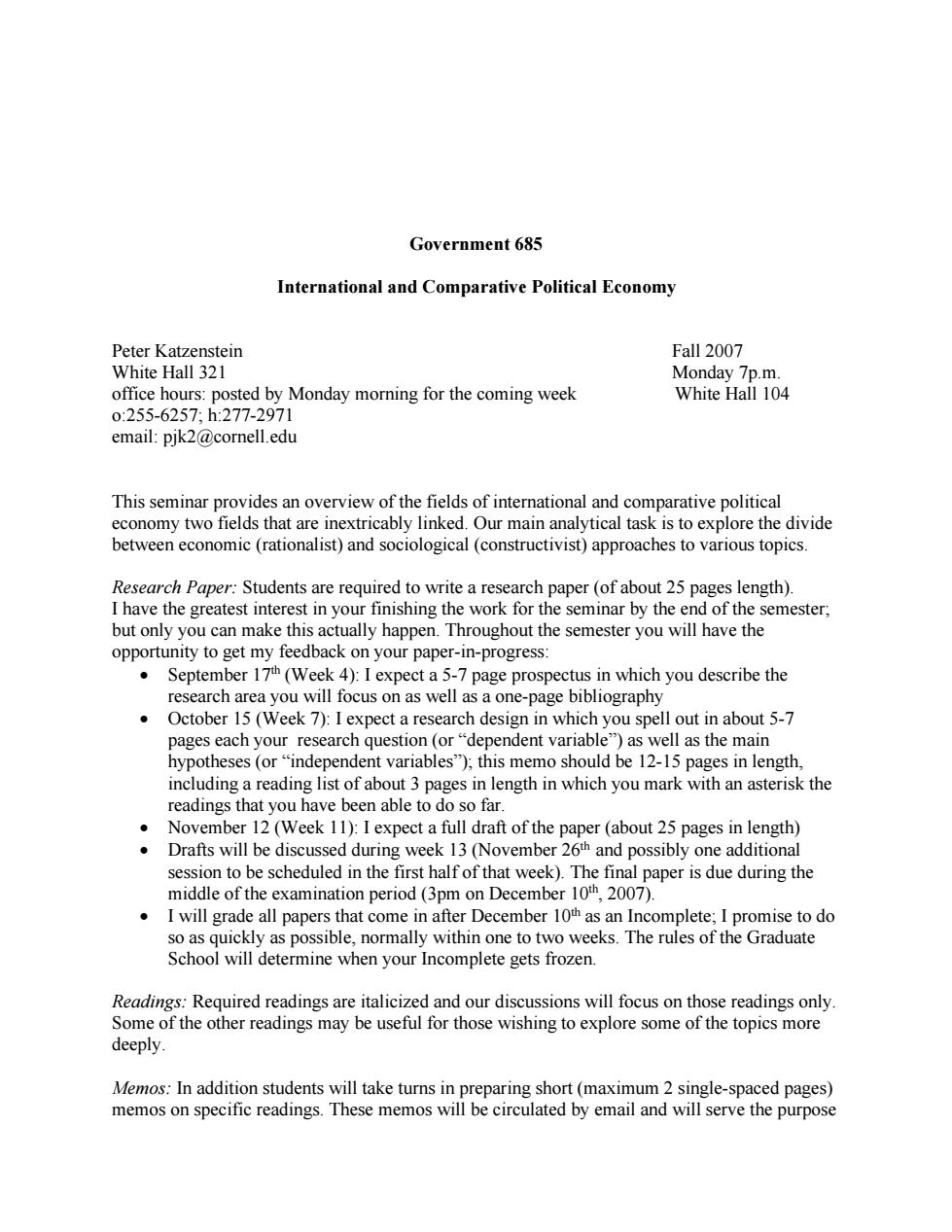
Government 685 International and Comparative Political Economy Peter Katzenstein Fall 2007 White Hall 321 Monday 7p.m. office hours:posted by Monday morning for the coming week White Hall 104 0:255-6257:h:277-2971 email:pjk2@cornell.edu This seminar provides an overview of the fields of international and comparative political economy two fields that are inextricably linked.Our main analytical task is to explore the divide between economic(rationalist)and sociological(constructivist)approaches to various topics. Research Paper:Students are required to write a research paper (of about 25 pages length) I have the greatest interest in your finishing the work for the seminar by the end of the semester; but only you can make this actually happen.Throughout the semester you will have the opportunity to get my feedback on your paper-in-progress: September 17th(Week 4):I expect a 5-7 page prospectus in which you describe the research area you will focus on as well as a one-page bibliography October 15(Week 7):I expect a research design in which you spell out in about 5-7 pages each your research question(or"dependent variable")as well as the main hypotheses(or"independent variables");this memo should be 12-15 pages in length, including a reading list of about 3 pages in length in which you mark with an asterisk the readings that you have been able to do so far. November 12(Week 11):I expect a full draft of the paper(about 25 pages in length) Drafts will be discussed during week 13(November 26th and possibly one additional session to be scheduled in the first half of that week).The final paper is due during the middle of the examination period(3pm on December 10th,2007). I will grade all papers that come in after December 10th as an Incomplete;I promise to do so as quickly as possible,normally within one to two weeks.The rules of the Graduate School will determine when your Incomplete gets frozen. Readings:Required readings are italicized and our discussions will focus on those readings only Some of the other readings may be useful for those wishing to explore some of the topics more deeply. Memos:In addition students will take turns in preparing short(maximum 2 single-spaced pages) memos on specific readings.These memos will be circulated by email and will serve the purpose
Government 685 International and Comparative Political Economy Peter Katzenstein Fall 2007 White Hall 321 Monday 7p.m. office hours: posted by Monday morning for the coming week White Hall 104 o:255-6257; h:277-2971 email: pjk2@cornell.edu This seminar provides an overview of the fields of international and comparative political economy two fields that are inextricably linked. Our main analytical task is to explore the divide between economic (rationalist) and sociological (constructivist) approaches to various topics. Research Paper: Students are required to write a research paper (of about 25 pages length). I have the greatest interest in your finishing the work for the seminar by the end of the semester; but only you can make this actually happen. Throughout the semester you will have the opportunity to get my feedback on your paper-in-progress: September 17 th (Week 4): I expect a 5-7 page prospectus in which you describe the research area you will focus on as well as a one-page bibliography October 15 (Week 7): I expect a research design in which you spell out in about 5-7 pages each your research question (or “dependent variable”) as well as the main hypotheses (or “independent variables”); this memo should be 12-15 pages in length, including a reading list of about 3 pages in length in which you mark with an asterisk the readings that you have been able to do so far. November 12 (Week 11): I expect a full draft of the paper (about 25 pages in length) Drafts will be discussed during week 13 (November 26 th and possibly one additional session to be scheduled in the first half of that week). The final paper is due during the middle of the examination period (3pm on December 10 th , 2007). I will grade all papers that come in after December 10 th as an Incomplete; I promise to do so as quickly as possible, normally within one to two weeks. The rules of the Graduate School will determine when your Incomplete gets frozen. Readings: Required readings are italicized and our discussions will focus on those readings only. Some of the other readings may be useful for those wishing to explore some of the topics more deeply. Memos: In addition students will take turns in preparing short (maximum 2 single-spaced pages) memos on specific readings. These memos will be circulated by email and will serve the purpose

of getting the discussion going and giving you summaries of the readings which maybe useful when you need to prepare for your written A-exams. Textbook:You should buy Robert Gilpin's Global Political Economy:Understanding the International Economic Order (Princeton University Press,2001)the basic text in the field of international political economy.Although I have put the relevant chapters of Gilpin's book on the syllabus as the lead reading in the different weeks,this is background reading that we shall normally not discuss in class.No similarly central text exists in the field of comparative political economy.Some of the books listed in week 9 are partial substitutes. Required Readings.Behind each reading I have noted where that reading can be found. Olin Room 405 means that a hard copy of the journal in which the article was published is in 405. Olin 405 Book Reserve means that the reading is on the designated shelf in Room 405 Olin 405 Reserve Box means that the reading is in a designated file box in Room 405. ● Olin E-Reserve and Uris E-Reserve means that the reading is put on E-Reserve under Gvt 685. For a few readings I have also given websites PART I:INTRODUCTION AND ANALYTICAL PERSPECTIVES Week 1:Introduction and Overview .Gilpin,chapters 1-2. Jeffry Frieden and Lisa Martin,"International Political Economy:The State of the Sub-Discipline,in Political Science:The State of the Discipline (edited by Ira Katznelson and Helen Milner).Available on-line at: http://www.wcfia.harvard.edu/papers/222 IPE SoD final.pdf N.J.Smelser and R.Swedberg,"The Sociological Perspective on the Economy," in Smelser and Swedberg,eds.,The Handbook of Economic Sociology,pp.3-26 (Uris E-Reserve and Olin 405 Book Reserve) B.J.Cohen,Building Bridges:The Construction of International Political Economy._(Olin 405 Reserve Box) .Jens Becker,Introduction."(Olin 405 Reserve Box) Craig M.Murphy amd Douglas R.Nelson,"International Political Economy:A Tale of Two Heterodoxies,"British Journal of Politics and International Relations 3,3(October2001):393-412. R.Little,"International Relations and the Triumph of Capitalism,"in K.Booth and S.Smith,eds.,International Relations Theory Today,pp.62-89 .S.Strange,"Political Economy and International Relations,in Booth and Smith, 154-74
of getting the discussion going and giving you summaries of the readings which maybe useful when you need to prepare for your written A-exams. Textbook: You should buy Robert Gilpin's Global Political Economy: Understanding the International Economic Order (Princeton University Press, 2001) the basic text in the field of international political economy. Although I have put the relevant chapters of Gilpin’s book on the syllabus as the lead reading in the different weeks, this is background reading that we shall normally not discuss in class. No similarly central text exists in the field of comparative political economy. Some of the books listed in week 9 are partial substitutes. Required Readings. Behind each reading I have noted where that reading can be found. Olin Room 405 means that a hard copy of the journal in which the article was published is in 405. Olin 405 Book Reserve means that the reading is on the designated shelf in Room 405. Olin 405 Reserve Box means that the reading is in a designated file box in Room 405. Olin E-Reserve and Uris E-Reserve means that the reading is put on E-Reserve under Gvt 685. For a few readings I have also given websites. PART I: INTRODUCTION AND ANALYTICAL PERSPECTIVES Week 1: Introduction and Overview Gilpin, chapters 1-2. Jef ry Frieden and Lisa Martin, “International Political Economy: The State of the Sub-Discipline,” in Political Science: The State of the Discipline (edited by Ira Katznelson and Helen Milner). Available on-line at: http://www.wcfia.harvard.edu/papers/222__IPE_SoD_final.pdf N. J. Smelser and R. Swedberg, "The Sociological Perspective on the Economy," in Smelser and Swedberg, eds., The Handbook of Economic Sociology, pp.3-26. (Uris E-Reserve and Olin 405 Book Reserve) B.J.Cohen, Building Bridges: The Construction of International Political Economy. (Olin 405 Reserve Box) Jens Becker, Introduction.” (Olin 405 Reserve Box) Craig M. Murphy amd Douglas R. Nelson, “International Political Economy: A Tale of Two Heterodoxies,” British Journal of Politics and International Relations 3, 3 (October 2001): 393-412. R. Little, "International Relations and the Triumph of Capitalism," in K. Booth and S. Smith, eds., International Relations Theory Today, pp.62-89. S. Strange, "Political Economy and International Relations," in Booth and Smith, 154-74

Week 2:History and Perspectives .Gilpin,chapters 3-6. 2.1 History .D.North,Structure and Change in Economic History,pp.ix-xi,3-68,143-86, 201-209.(Olin Book Reserve) Field,"The Problem with Neoclassical Institutional Economics,"Explorations in Economic History 18 (April 1981),pp.174-198.(Uris E-Reserve) .R.Gilpin,War and Change in World Politics,pp.9-29,156-185. .Henrik Spruyt,The Sovereign State and Its Competitors,pp.3-33,153-194. 2.2 Economic Rationalism (and Its Critics) .G.Becker,The Economic Approach to Human Behavior,pp.3-14.(Uris E-Reserve) .N.Rosenberg,"Can Economic Theory Explain Everything?"Philosophy of the Social Sciences 9:4 (1979),pp.509-29.(Olin Room 405) R.Coase,"The Institutional Structure of Production",American Economic Review82:4(Sept 1992),pp.713-719.(Olin E-Reserve) .R.Coase,"The Problem of Social Cost",Journal of Law and Economics 3 (October 1960),reprinted in his The Firm.The Market and The Law,pp.95-119,153-156. (Olin E-Reserve) .Sen,"Internal Consistency ofChoice",Econometrica 61:3 (May 1993),pp.495-521. (Olin E-Reserve) M.Friedman,"The Methodology of Positive Economics",in his Essays in Positive Economics,pp.3-43. S.M.Amadae,Rationalizing Capitalist Democracy:The Cold War Origins of Rational Choice Liberalism 2.3 Economic Sociology (and Its Critics) P.DiMaggio,"Culture and Economy,in Smelser and Swedberg,eds.,Handbook of Economic Sociology,pp.27-57.(Olin 405 Book Reserve) Mark Blyth,Great Transformations:Economic Ideas and Institutional Change in the Twentieth Century.chps.1,2,8.(Olin 405 Book Reserve) C.F.Sabel,""Learning by Monitoring:The Institutions of Economic Development,"in Smelser and Swedberg,pp.137-65.(Olin 405 Book Reserve) J.S.Coleman,"A Rational Choice Perspective on Economic Sociology,in Smelser and Swedberg,pp.166-180.(Olin 405 Book Reserve) .Eric Helleiner and Andreas Pickel,eds.,Economic Nationalism in a Globalizing World,pp.220-234. P.Hall,ed.,The Political Power of Economic Ideas,Introduction and Conclusion. Bai Gao,Economic Ideology and Japanese Industrial Policy. 2.4 Interests,Preferences and Incentives C.Woll,"Interests and Preferences in Political Economy Analyses."(Olin 405
Week 2: History and Perspectives Gilpin, chapters 3-6. 2.1 History D. North, Structure and Change in Economic History, pp. ix-xi, 3-68, 143-86, 201-209. (Olin Book Reserve) Field, "The Problem with Neoclassical Institutional Economics," Explorations in Economic History 18 (April 1981), pp.174-198. (Uris E-Reserve) R. Gilpin, War and Change in World Politics, pp. 9-29, 156-185. Henrik Spruyt, The Sovereign State and Its Competitors, pp. 3-33, 153-194. 2.2 Economic Rationalism (and Its Critics) G. Becker, The Economic Approach to Human Behavior, pp. 3-14. (Uris E-Reserve) N. Rosenberg, "Can Economic Theory Explain Everything?" Philosophy of the Social Sciences 9:4 (1979), pp. 509-29. (Olin Room 405) R. Coase, "The Institutional Structure of Production", American Economic Review82:4 (Sept 1992), pp. 713-719. (Olin E-Reserve) R. Coase, "The Problem of Social Cost", Journal of Law and Economics 3 (October 1960), reprinted in his The Firm, The Market and The Law, pp. 95-119, 153-156. (Olin E-Reserve) Sen, "Internal Consistency of Choice", Econometrica 61:3 (May 1993), pp. 495-521. (Olin E-Reserve) M. Friedman, "The Methodology of Positive Economics", in his Essays in Positive Economics, pp. 3-43. S.M.Amadae, Rationalizing Capitalist Democracy: The Cold War Origins of Rational Choice Liberalism. 2.3 Economic Sociology (and Its Critics) P. DiMaggio, "Culture and Economy," in Smelser and Swedberg, eds., Handbook of Economic Sociology, pp.27-57. (Olin 405 Book Reserve) Mark Blyth, Great Transformations: Economic Ideas and Institutional Change in the Twentieth Century, chps. 1,2,8. (Olin 405 Book Reserve) C.F. Sabel, “”Learning by Monitoring: The Institutions of Economic Development,” in Smelser and Swedberg, pp. 137-65. (Olin 405 Book Reserve) J. S. Coleman, "A Rational Choice Perspective on Economic Sociology," in Smelser and Swedberg, pp.166-180. (Olin 405 Book Reserve) Eric Helleiner and Andreas Pickel, eds., Economic Nationalism in a Globalizing World, pp.220-234. P. Hall, ed., The Political Power of Economic Ideas, Introduction and Conclusion. Bai Gao, Economic Ideology and Japanese Industrial Policy. 2.4 Interests, Preferences and Incentives C. Woll, “Interests and Preferences in Political Economy Analyses.” (Olin 405
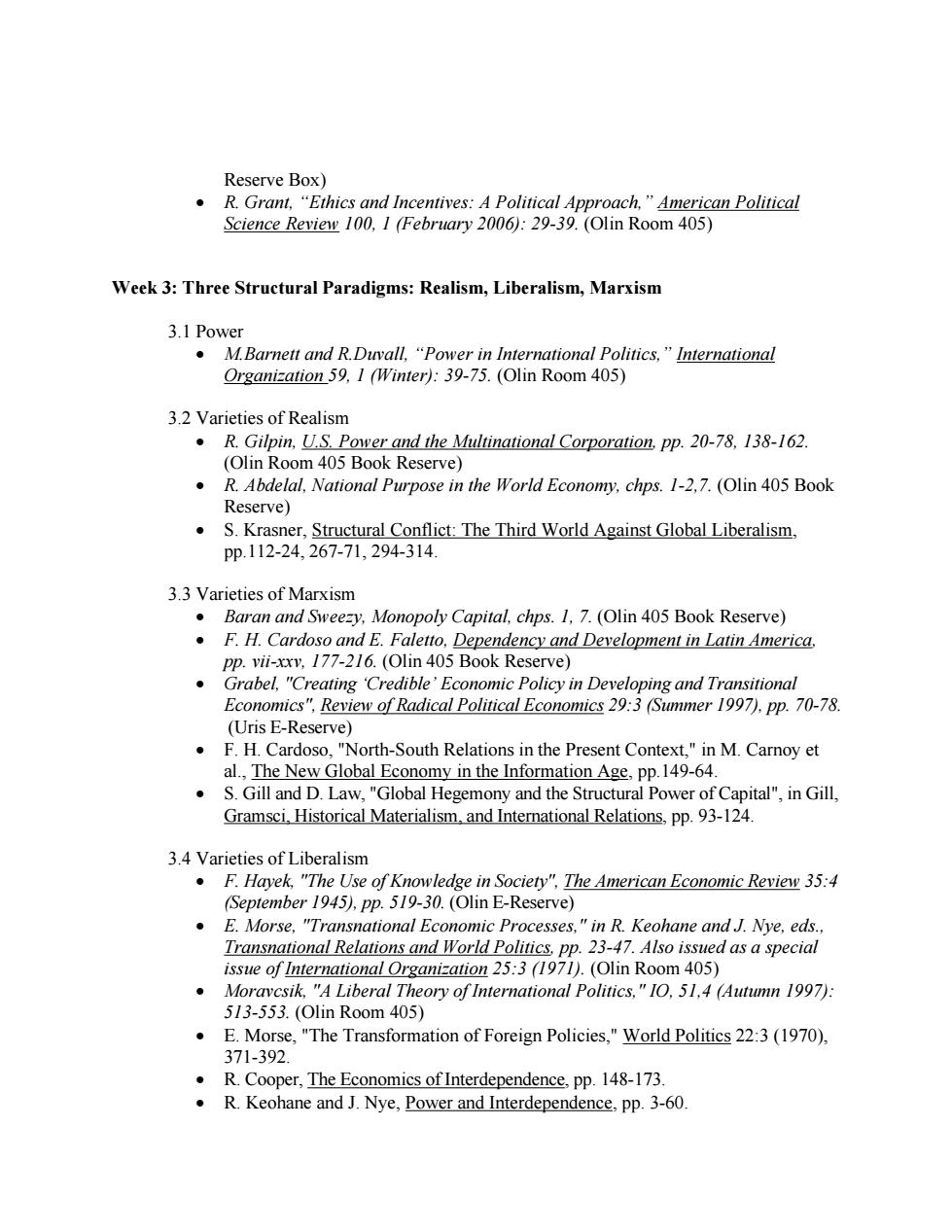
Reserve Box) R.Grant,"Ethics and Incentives:A Political Approach,American Political Science Review 100,1 (February 2006):29-39.(Olin Room 405) Week 3:Three Structural Paradigms:Realism,Liberalism,Marxism 3.1 Power M.Barnett and R.Duvall,"Power in International Politics,"International Organization 59,1 (Winter):39-75.(Olin Room 405) 3.2 Varieties of Realism .R.Gilpin,U.S.Power and the Multinational Corporation,pp.20-78,138-162. (Olin Room 405 Book Reserve) .R.Abdelal,National Purpose in the World Economy,chps.1-2,7.(Olin 405 Book Reserve) .S.Krasner,Structural Conflict:The Third World Against Global Liberalism, pp.112-24,267-71,294-314. 3.3 Varieties of Marxism .Baran and Sweezy,Monopoly Capital,chps.1,7.(Olin 405 Book Reserve) .F.H.Cardoso and E.Faletto,Dependency and Development in Latin America. pp.vii-xxv,177-216.(Olin 405 Book Reserve) Grabel,"Creating Credible'Economic Policy in Developing and Transitional Economics",Review of Radical Political Economics 29:3(Summer 1997),pp.70-78. (Uris E-Reserve) F.H.Cardoso,"North-South Relations in the Present Context,"in M.Carnoy et al.,The New Global Economy in the Information Age,pp.149-64. S.Gill and D.Law,"Global Hegemony and the Structural Power of Capital",in Gill, Gramsci.Historical Materialism,and International Relations,pp.93-124. 3.4 Varieties of Liberalism F.Hayek,"The Use of Knowledge in Society",The American Economic Review 35:4 (September 1945),pp.519-30.(Olin E-Reserve) E.Morse,"Transnational Economic Processes,in R.Keohane and J.Nye,eds., Transnational Relations and World Politics,pp.23-47.Also issued as a special issue of International Organization 25:3 (1971).(Olin Room 405) .Moravcsik,"A Liberal Theory of International Politics,"1O,51,4 (Autumn 1997): 513-553.(Olin Room405) E.Morse,"The Transformation of Foreign Policies,World Politics 22:3(1970), 371-392. .R.Cooper,The Economics of Interdependence,pp.148-173. R.Keohane and J.Nye,Power and Interdependence,pp.3-60
Reserve Box) R. Grant, “Ethics and Incentives: A Political Approach,” American Political Science Review 100, 1 (February 2006): 29-39. (Olin Room 405) Week 3: Three Structural Paradigms: Realism, Liberalism, Marxism 3.1 Power M.Barnett and R.Duvall, “Power in International Politics,” International Organization 59, 1 (Winter): 39-75. (Olin Room 405) 3.2 Varieties of Realism R. Gilpin, U.S. Power and the Multinational Corporation, pp. 20-78, 138-162. (Olin Room 405 Book Reserve) R. Abdelal, National Purpose in the World Economy, chps. 1-2,7. (Olin 405 Book Reserve) S. Krasner, Structural Conflict: The Third World Against Global Liberalism, pp.112-24, 267-71, 294-314. 3.3 Varieties of Marxism Baran and Sweezy, Monopoly Capital, chps. 1, 7. (Olin 405 Book Reserve) F. H. Cardoso and E. Faletto, Dependency and Development in Latin America, pp. vii-xxv, 177-216. (Olin 405 Book Reserve) Grabel, "Creating ‘Credible’ Economic Policy in Developing and Transitional Economics", Review of Radical Political Economics 29:3 (Summer 1997), pp. 70-78. (Uris E-Reserve) F. H. Cardoso, "North-South Relations in the Present Context," in M. Carnoy et al., The New Global Economy in the Information Age, pp.149-64. S. Gill and D. Law, "Global Hegemony and the Structural Power of Capital", in Gill, Gramsci, Historical Materialism, and International Relations, pp. 93-124. 3.4 Varieties of Liberalism F. Hayek, "The Use of Knowledge in Society", The American Economic Review 35:4 (September 1945), pp. 519-30. (Olin E-Reserve) E. Morse, "Transnational Economic Processes," in R. Keohane and J. Nye, eds., Transnational Relations and World Politics, pp. 23-47. Also issued as a special issue of International Organization 25:3 (1971). (Olin Room 405) Moravcsik, "A Liberal Theory of International Politics," IO, 51,4 (Autumn 1997): 513-553. (Olin Room 405) E. Morse, "The Transformation of Foreign Policies," World Politics 22:3 (1970), 371-392. R. Cooper, The Economics of Interdependence, pp. 148-173. R. Keohane and J. Nye, Power and Interdependence, pp. 3-60
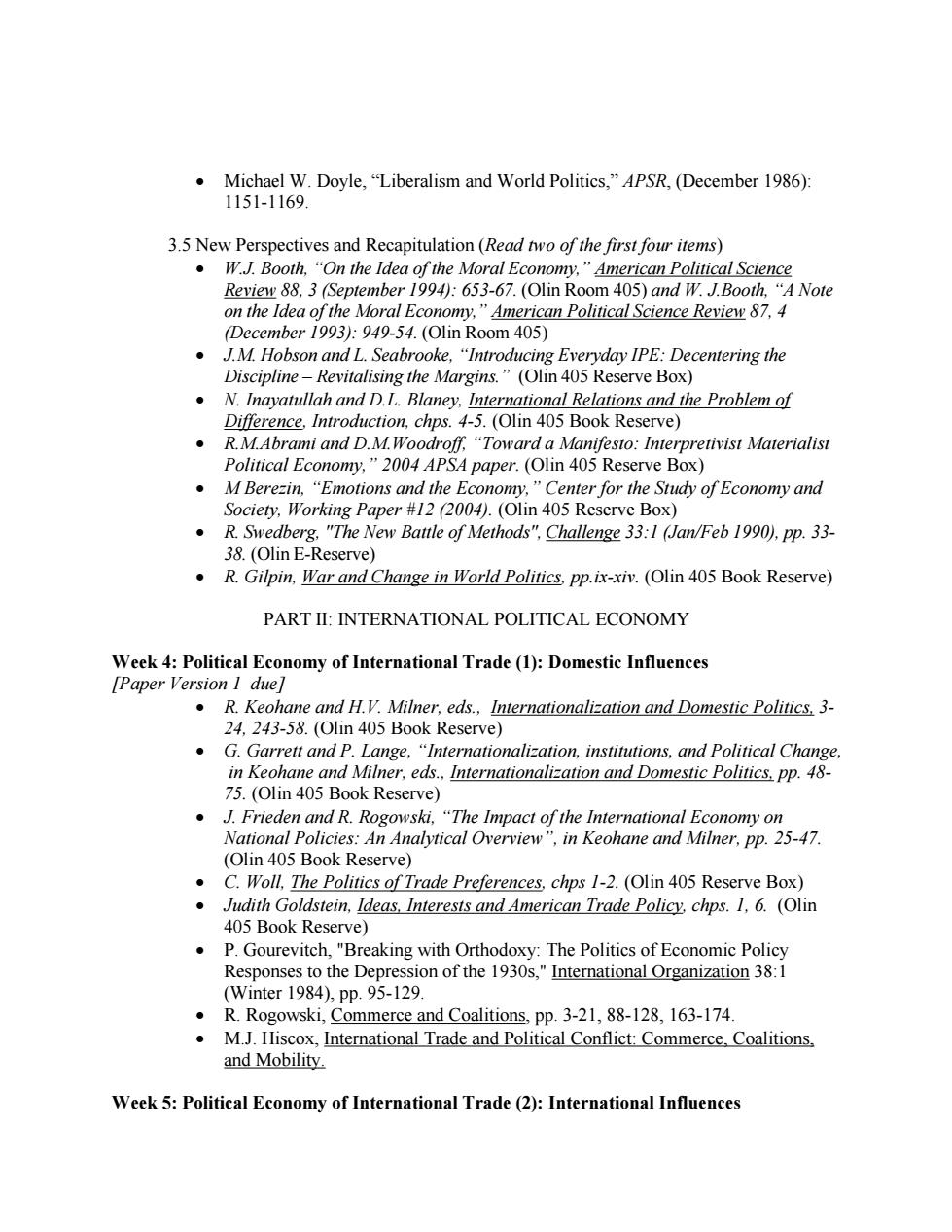
Michael W.Doyle,"Liberalism and World Politics,"APSR,(December 1986): 1151-1169. 3.5 New Perspectives and Recapitulation(Read two of the first four items) .W.J.Booth,"On the Idea of the Moral Economy,American Political Science Review 88,3 (September 1994):653-67.(Olin Room 405)and W.J.Booth,"A Note on the Idea of the Moral Economy,American Political Science Review 87,4 (December 1993):949-54.(Olin Room 405) .J.M.Hobson and L.Seabrooke,"Introducing Everyday IPE:Decentering the Discipline-Revitalising the Margins."(Olin 405 Reserve Box) N.Inayatullah and D.L.Blaney,International Relations and the Problem of Difference,Introduction,chps.4-5.(Olin 405 Book Reserve) R.M.Abrami and D.M.Woodroff,"Toward a Manifesto:Interpretivist Materialist Political Economy,"2004 APSA paper.(Olin 405 Reserve Box) M Berezin,"Emotions and the Economy,Center for the Study of Economy and Society,Working Paper #12 (2004).(Olin 405 Reserve Box) .R.Swedberg,"The New Battle of Methods",Challenge 33:1 (Jan/Feb 1990),pp.33- 38.(Olin E-Reserve) R.Gilpin,War and Change in World Politics,pp.ix-xiv.(Olin 405 Book Reserve) PART II:INTERNATIONAL POLITICAL ECONOMY Week 4:Political Economy of International Trade(1):Domestic Influences [Paper Version I due] R.Keohane and H.V.Milner,eds.,Internationalization and Domestic Politics.3- 24,243-58.(Olin 405 Book Reserve) .G.Garrett and P.Lange,"Internationalization,institutions,and Political Change, in Keohane and Milner,eds.,Internationalization and Domestic Politics.pp.48- 75.(Olin 405 Book Reserve) J.Frieden and R.Rogowski,"The Impact of the International Economy on National Policies:An Analytical Overview",in Keohane and Milner,pp.25-47. (Olin 405 Book Reserve) .C.Woll,The Politics of Trade Preferences,chps 1-2.(Olin 405 Reserve Box) Judith Goldstein,Ideas,Interests and American Trade Policy,chps.1,6.(Olin 405 Book Reserve) P.Gourevitch,"Breaking with Orthodoxy:The Politics of Economic Policy Responses to the Depression of the 1930s,"International Organization 38:1 (Winter1984),pp.95-129. R.Rogowski,Commerce and Coalitions,pp.3-21,88-128,163-174. M.J.Hiscox,International Trade and Political Conflict:Commerce,Coalitions, and Mobility. Week 5:Political Economy of International Trade(2):International Influences
Michael W. Doyle, “Liberalism and World Politics,” APSR, (December 1986): 1151-1169. 3.5 New Perspectives and Recapitulation (Read two of the first four items) W.J. Booth, “On the Idea of the Moral Economy,” American Political Science Review 88, 3 (September 1994): 653-67. (Olin Room 405) and W. J.Booth, “A Note on the Idea of the Moral Economy,” American Political Science Review 87, 4 (December 1993): 949-54. (Olin Room 405) J.M. Hobson and L. Seabrooke, “Introducing Everyday IPE: Decentering the Discipline – Revitalising the Margins.” (Olin 405 Reserve Box) N. Inayatullah and D.L. Blaney, International Relations and the Problem of Dif erence, Introduction, chps. 4-5. (Olin 405 Book Reserve) R.M.Abrami and D.M.Woodrof , “Toward a Manifesto: Interpretivist Materialist Political Economy,” 2004 APSA paper. (Olin 405 Reserve Box) M Berezin, “Emotions and the Economy,” Center for the Study of Economy and Society, Working Paper #12 (2004). (Olin 405 Reserve Box) R. Swedberg, "The New Battle of Methods", Challenge 33:1 (Jan/Feb 1990), pp. 33- 38. (Olin E-Reserve) R. Gilpin, War and Change in World Politics, pp.ix-xiv. (Olin 405 Book Reserve) PART II: INTERNATIONAL POLITICAL ECONOMY Week 4: Political Economy of International Trade (1): Domestic Influences [Paper Version 1 due] R. Keohane and H.V. Milner, eds., Internationalization and Domestic Politics, 3- 24, 243-58. (Olin 405 Book Reserve) G. Garrett and P. Lange, “Internationalization, institutions, and Political Change, in Keohane and Milner, eds., Internationalization and Domestic Politics, pp. 48- 75. (Olin 405 Book Reserve) J. Frieden and R. Rogowski, “The Impact of the International Economy on National Policies: An Analytical Overview”, in Keohane and Milner, pp. 25-47. (Olin 405 Book Reserve) C. Woll, The Politics of Trade Preferences, chps 1-2. (Olin 405 Reserve Box) Judith Goldstein, Ideas, Interests and American Trade Policy, chps. 1, 6. (Olin 405 Book Reserve) P. Gourevitch, "Breaking with Orthodoxy: The Politics of Economic Policy Responses to the Depression of the 1930s," International Organization 38:1 (Winter 1984), pp. 95-129. R. Rogowski, Commerce and Coalitions, pp. 3-21, 88-128, 163-174. M.J. Hiscox, International Trade and Political Conflict: Commerce, Coalitions, and Mobility. Week 5: Political Economy of International Trade (2): International Influences
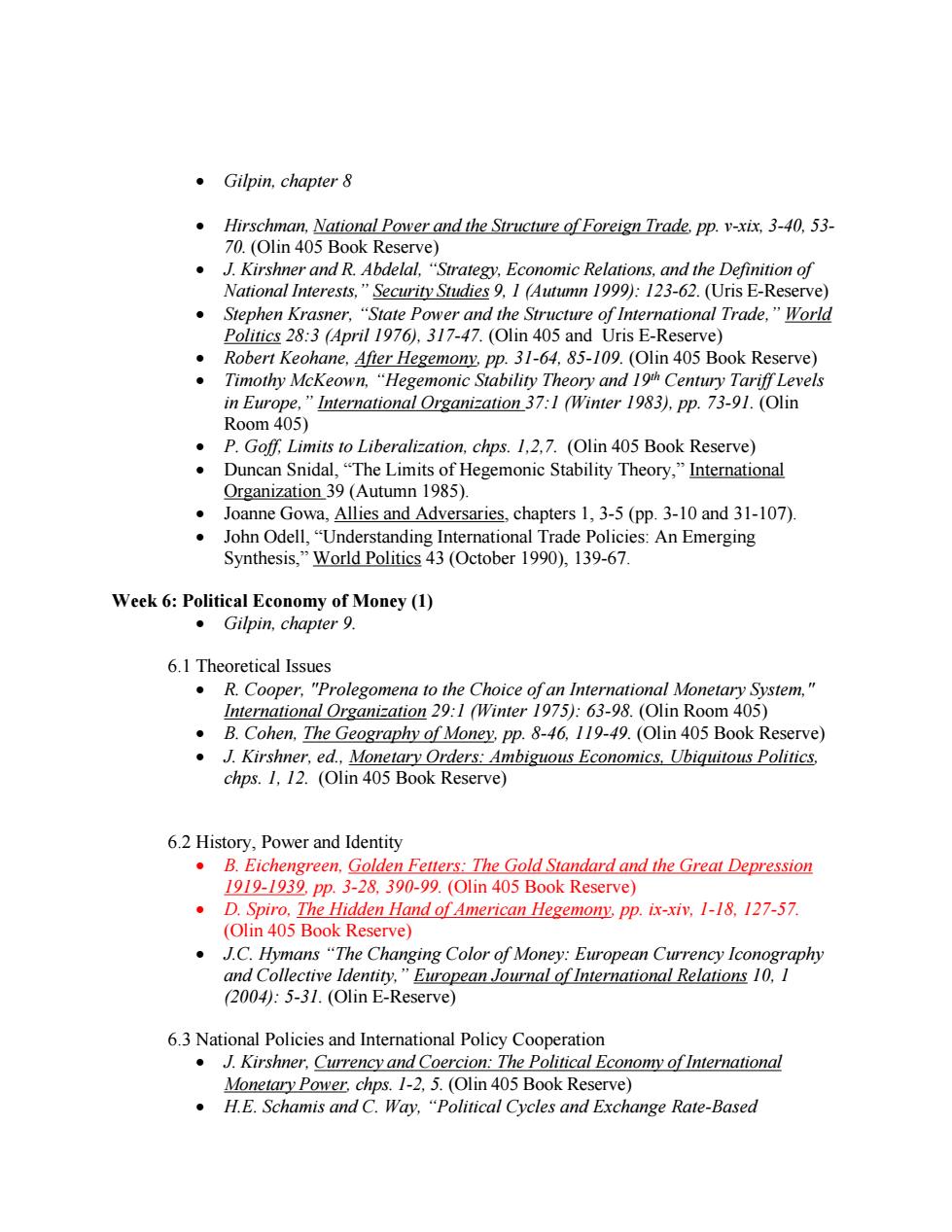
·Gilpin..chapter8 .Hirschman,National Power and the Structure of Foreign Trade,pp.v-xix,3-40,53- 70.(Olin 405 Book Reserve) J.Kirshner and R.Abdelal,"Strategy,Economic Relations,and the Definition of National Interests,"Security Studies 9,1 (Autumn 1999):123-62.(Uris E-Reserve) .Stephen Krasner,"State Power and the Structure of International Trade,"World Politics 28:3 (April 1976),317-47.(Olin 405 and Uris E-Reserve) .Robert Keohane,After Hegemony,pp.31-64,85-109.(Olin 405 Book Reserve) Timothy McKeown,"Hegemonic Stability Theory and 19ih Century Tariff Levels in Europe,"International Organization 37:1 (Winter 1983),pp.73-91.(Olin Room 405) .P.Goff,Limits to Liberalization,chps.1,2,7.(Olin 405 Book Reserve) Duncan Snidal,"The Limits of Hegemonic Stability Theory,"International Organization 39(Autumn 1985). Joanne Gowa,Allies and Adversaries,chapters 1,3-5(pp.3-10 and 31-107) John Odell,"Understanding International Trade Policies:An Emerging Synthesis,"World Politics 43 (October 1990),139-67. Week 6:Political Economy of Money (1) ·Gilpin,.chapter 9. 6.1 Theoretical Issues R.Cooper,"Prolegomena to the Choice of an International Monetary System, International Organization 29:1 (Winter 1975):63-98.(Olin Room 405) B.Cohen,The Geography of Money,pp.8-46,119-49.(Olin 405 Book Reserve) .J.Kirshner,ed.,Monetary Orders:Ambiguous Economics,Ubiquitous Politics, chps.1,12.(Olin 405 Book Reserve) 6.2 History,Power and Identity .B.Eichengreen.Golden Fetters:The Gold Standard and the Great Depression 1919-1939,pp.3-28,390-99.(Olin405 Book Reserve) .D.Spiro.The Hidden Hand of American Hegemony,pp.ix-xiv,1-18,127-57. (Olin 405 Book Reserve) J.C.Hymans "The Changing Color of Money:European Currency Iconography and Collective Identity,European Journal of International Relations 10,I (2004):5-31.(Olin E-Reserve) 6.3 National Policies and International Policy Cooperation .J.Kirshner,Currency and Coercion:The Political Economy of International Monetary Power,chps.1-2,5.(Olin 405 Book Reserve) H.E.Schamis and C.Way,"Political Cycles and Exchange Rate-Based
Gilpin, chapter 8 Hirschman, National Power and the Structure of Foreign Trade, pp. v-xix, 3-40, 53- 70. (Olin 405 Book Reserve) J. Kirshner and R. Abdelal, “Strategy, Economic Relations, and the Definition of National Interests,” Security Studies 9, 1 (Autumn 1999): 123-62. (Uris E-Reserve) Stephen Krasner, “State Power and the Structure of International Trade,” World Politics 28:3 (April 1976), 317-47. (Olin 405 and Uris E-Reserve) Robert Keohane, After Hegemony, pp. 31-64, 85-109. (Olin 405 Book Reserve) Timothy McKeown, “Hegemonic Stability Theory and 19 th Century Tarif Levels in Europe,” International Organization 37:1 (Winter 1983), pp. 73-91. (Olin Room 405) P. Gof , Limits to Liberalization, chps. 1,2,7. (Olin 405 Book Reserve) Duncan Snidal, “The Limits of Hegemonic Stability Theory,” International Organization 39 (Autumn 1985). Joanne Gowa, Allies and Adversaries, chapters 1, 3-5 (pp. 3-10 and 31-107). John Odell, “Understanding International Trade Policies: An Emerging Synthesis,” World Politics 43 (October 1990), 139-67. Week 6: Political Economy of Money (1) Gilpin, chapter 9. 6.1 Theoretical Issues R. Cooper, "Prolegomena to the Choice of an International Monetary System," International Organization 29:1 (Winter 1975): 63-98. (Olin Room 405) B. Cohen, The Geography of Money, pp. 8-46, 119-49. (Olin 405 Book Reserve) J. Kirshner, ed., Monetary Orders: Ambiguous Economics, Ubiquitous Politics, chps. 1, 12. (Olin 405 Book Reserve) 6.2 History, Power and Identity B. Eichengreen, Golden Fetters: The Gold Standard and the Great Depression 1919-1939, pp. 3-28, 390-99. (Olin 405 Book Reserve) D. Spiro, The Hidden Hand of American Hegemony, pp. ix-xiv, 1-18, 127-57. (Olin 405 Book Reserve) J.C. Hymans “The Changing Color of Money: European Currency Iconography and Collective Identity,” European Journal of International Relations 10, 1 (2004): 5-31. (Olin E-Reserve) 6.3 National Policies and International Policy Cooperation J. Kirshner, Currency and Coercion: The Political Economy of International Monetary Power, chps. 1-2, 5. (Olin 405 Book Reserve) H.E. Schamis and C. Way, “Political Cycles and Exchange Rate-Based

Stabilization,World Politics 56,1 (October 2003):43-78.(Olin Room 405) K.McNamara,The Currency of ldeas:Monetary Politics in the European Union, chps.1-2,6-7.(Olin 405 Book Reserve) .R.T.Naylor,Wages of Crime,chps.1,4.(Olin 405 Book Reserve) .C.R.Henning,Currencies and Politics in the U.S.,Germany and Japan,pp.1-60, 309-41. Jeffrey A.Frankel,No Single Currency Regime is Right for All Countries or at all Times.Essays in International Finance No.215,Princeton University (August 1999):1-45. Week 7:Political Economy of Finance and Foreign Investment [Paper Version 2 duel .Gilpin,chapters 10-11. 7.1 Global Finance .C.Kindleberger,Manias,Panics.and Crashes [3rd ed),pp.11-20,164-89.(Olin 405 Book Reserve) D.Andrews,"Capital Mobility and State Autonomy:Toward a Structural Theory of International Monetary Relations",International Studies Quarterly 38:2 (June 1994),pp.193-218.(Olin Room405) J.Frieden,"Invested Interests:The Politics of National Economic Policies in a World of Global Finance,International Organization 45:4 (1991):425-52.(Olin Room 405) .E.Helleiner,States and the Reemergence of Global Finance:From Bretton Woods to the 1990s,chps.1,6-7,9.(Olin Book Reserve) .J.Goodman and L.Pauly,"The Obsolescence of Capital Controls?Economic Management in an Age of Global Markets"World Politics 46:1 (October 1993),pp. 50-82.(Olin Room 405) D.R.Holmes and G.E.Marcus,"Cultures of Expertise and the Management of Globalization:Toward a Refunctioning of Ethnography,"in A.Ong and S.J.Collier, eds,Global Assemblages,chp.13.(Olin 405 Book Reserve) Dennis Quinn and Carla Inclan,"The Origins of Financial Openness:A Study of Current and Capital Account Liberalization,"American Journal of Political Science41:3(July1997),771-813. 7.2 International Financial Markets and Crises .T.J.Pempel,"Introduction",in Pempel (ed.),The Politics of the Asian Economic Crisis,pp.1-14.(Olin 405 Book Reserve) A.Macintyre,The Power of Institutions,chps.1-3.(Olin 405 Book Reserve) Hamilton-Hart,Asian States,Asian Bankers:Central Banking in Southeast Asia, chps.1,2,6-8.(Olin 405 Book Reserve) L.Seabrooke,The Social Sources of Financial Power:Domestic Legitimacy and International Financial Orders,chps.1,8,9.(Olin 405 Book Reserve)
Stabilization,” World Politics 56, 1 (October 2003): 43-78. (Olin Room 405) K. McNamara, The Currency of Ideas: Monetary Politics in the European Union, chps.1-2,6-7. (Olin 405 Book Reserve) R.T. Naylor, Wages of Crime, chps. 1, 4. (Olin 405 Book Reserve) C. R. Henning, Currencies and Politics in the U.S., Germany and Japan, pp.1-60, 309-41. Jeffrey A. Frankel, No Single Currency Regime is Right for All Countries or at all Times. Essays in International Finance No. 215, Princeton University (August 1999):1-45. Week 7: Political Economy of Finance and Foreign Investment [Paper Version 2 due] Gilpin, chapters 10-11. 7.1 Global Finance C. Kindleberger, Manias, Panics, and Crashes [3rd ed], pp. 11-20, 164-89. (Olin 405 Book Reserve) D. Andrews, "Capital Mobility and State Autonomy: Toward a Structural Theory of International Monetary Relations", International Studies Quarterly 38:2 (June 1994), pp. 193-218. (Olin Room 405) J. Frieden, "Invested Interests: The Politics of National Economic Policies in a World of Global Finance," International Organization 45:4 (1991): 425-52. (Olin Room 405) E. Helleiner, States and the Reemergence of Global Finance: From Bretton Woods to the 1990s, chps. 1, 6-7, 9. (Olin Book Reserve) J. Goodman and L. Pauly, "The Obsolescence of Capital Controls? Economic Management in an Age of Global Markets", World Politics 46:1 (October 1993), pp. 50-82. (Olin Room 405) D.R. Holmes and G.E. Marcus, “Cultures of Expertise and the Management of Globalization: Toward a Refunctioning of Ethnography,” in A. Ong and S. J. Collier, eds, Global Assemblages , chp. 13. (Olin 405 Book Reserve) Dennis Quinn and Carla Inclan, “The Origins of Financial Openness: A Study of Current and Capital Account Liberalization,” American Journal of Political Science 41:3 (July 1997), 771-813. 7.2 International Financial Markets and Crises T. J. Pempel, “Introduction”, in Pempel (ed.), The Politics of the Asian Economic Crisis, pp.1-14. (Olin 405 Book Reserve) A. Macintyre, The Power of Institutions, chps. 1-3. (Olin 405 Book Reserve) Hamilton-Hart, Asian States, Asian Bankers: Central Banking in Southeast Asia, chps.1,2,6-8. (Olin 405 Book Reserve) L. Seabrooke, The Social Sources of Financial Power: Domestic Legitimacy and International Financial Orders, chps. 1, 8,9. (Olin 405 Book Reserve)

.S.Griffith-Jones,"International Financial Markets:A Case of Market Failure",in C. Colclough and J.Manor(eds.)States or Markets?,pp.101-120 J.Winters,"The Determinant of Financial Crisis in Asia",in Pempel,The Politics of the Asian Economic Crisis pp.79-97. 7.3 Foreign Investment R.Vernon,"International Investment and International Trade in the Product Cycle,"Ouarterly Journal of Economics 80(1966),pp.190-207.(Olin E-Reserve) R.Vernon,"The Product Cycle Hypothesis is a New International Environment," Oxford Bulletin of Economics and Statistics 41,4 (November 1979),pp.255-67. (Olin E-Reserve) P.H.Kristensen and J.Zeitlin,Local Players in Global Games,chps.1,10-12. (Olin 405 Book Reserve) P.H.Doremus,W.W.Keller,L.W.Pauly and S.Reich,The Myth of the Global Corporation,chps.1-3.(Olin 405 Book Reserve) .T.Moran,"Foreign Expansion as an Institutional Necessity,"World Politics 25:2 (Aprl1973),pp.369-383. .H.Schwartz,States Versus Markets,pp.240-58. Week 8:Developmental States,Strategic Trade,and Sanctions Gilpin,chapter 12. 8.1 Strategic Trade P.Krugman,Strategic Trade Policy and the New International Economics,chps. 1-3.(Olin 405 Book Reserve) .J.D.Richardson,"The Political Economy of Strategic Trade Policy," International Organization 44:1 (Winter 1990),pp.1-18.(Olin Room 405) .Paul Krugman,"Competitiveness:A Dangerous Obsession,Foreign Affairs (March/April 1994),28-44.(Olin Room 405). R.Samuels,Rich Nation.Strong Army:National Security and the Technological Transformation of.Japan,pp.1-32.(Olin 405 Book Reserve) .L.Tyson,Who is Bashing Whom?,pp.1-45. .M.Kahler,"External Ambition and Economic Performance",World Politics 40:4 (July1988),pp.419-51. H.Kitschelt,"Industrial Governance Structures,Innovation Strategies,and the Case of Japan:Sectoral or Cross-national Comparative Analysis?"International Organization 45,4 (Autumn 1991):453-93. 8.2 Sanctions and Power .M.Mastanduno,Economic Containment:Cocom and the Politics of East-West Trade,pp.1-38,310-44.(Olin 405 Book Reserve) .J.Kirshner,"The Microfoundations of Economic Sanctions",Security Studies 6:3 (Spring 1998),pp.32-62.(Uris E-Reserve)
S. Griffith-Jones, "International Financial Markets: A Case of Market Failure", in C. Colclough and J. Manor (eds.) States or Markets?, pp. 101-120. J. Winters, “The Determinant of Financial Crisis in Asia”, in Pempel, The Politics of the Asian Economic Crisis pp. 79-97. 7.3 Foreign Investment R. Vernon, "International Investment and International Trade in the Product Cycle," Quarterly Journal of Economics 80 (1966), pp.190-207. (Olin E-Reserve) R. Vernon, "The Product Cycle Hypothesis is a New International Environment," Oxford Bulletin of Economics and Statistics 41,4 (November 1979), pp.255-67. (Olin E-Reserve) P.H. Kristensen and J. Zeitlin, Local Players in Global Games, chps. 1,10-12. (Olin 405 Book Reserve) P.H. Doremus, W.W. Keller, L.W. Pauly and S. Reich, The Myth of the Global Corporation, chps. 1-3. (Olin 405 Book Reserve) T. Moran, "Foreign Expansion as an Institutional Necessity," World Politics 25:2 (April 1973), pp. 369-383. H. Schwartz, States Versus Markets, pp. 240-58. Week 8: Developmental States, Strategic Trade, and Sanctions Gilpin, chapter 12. 8.1 Strategic Trade P. Krugman, Strategic Trade Policy and the New International Economics, chps. 1-3. (Olin 405 Book Reserve) J.D. Richardson, "The Political Economy of Strategic Trade Policy," International Organization 44:1 (Winter 1990), pp.1-18. (Olin Room 405) Paul Krugman, “Competitiveness: A Dangerous Obsession,” Foreign Af airs (March/April 1994), 28-44. (Olin Room 405). R. Samuels, Rich Nation, Strong Army: National Security and the Technological Transformation of Japan, pp. 1-32. (Olin 405 Book Reserve) L. Tyson, Who is Bashing Whom?, pp.1-45. M. Kahler, "External Ambition and Economic Performance", World Politics 40:4 (July 1988), pp. 419-51. H. Kitschelt, “Industrial Governance Structures, Innovation Strategies, and the Case of Japan: Sectoral or Cross-national Comparative Analysis?” International Organization 45,4 (Autumn 1991): 453-93. 8.2 Sanctions and Power M. Mastanduno, Economic Containment: Cocom and the Politics of East-West Trade, pp.1-38, 310-44. (Olin 405 Book Reserve) J. Kirshner, “The Microfoundations of Economic Sanctions”, Security Studies 6:3 (Spring 1998), pp. 32-62. (Uris E-Reserve)
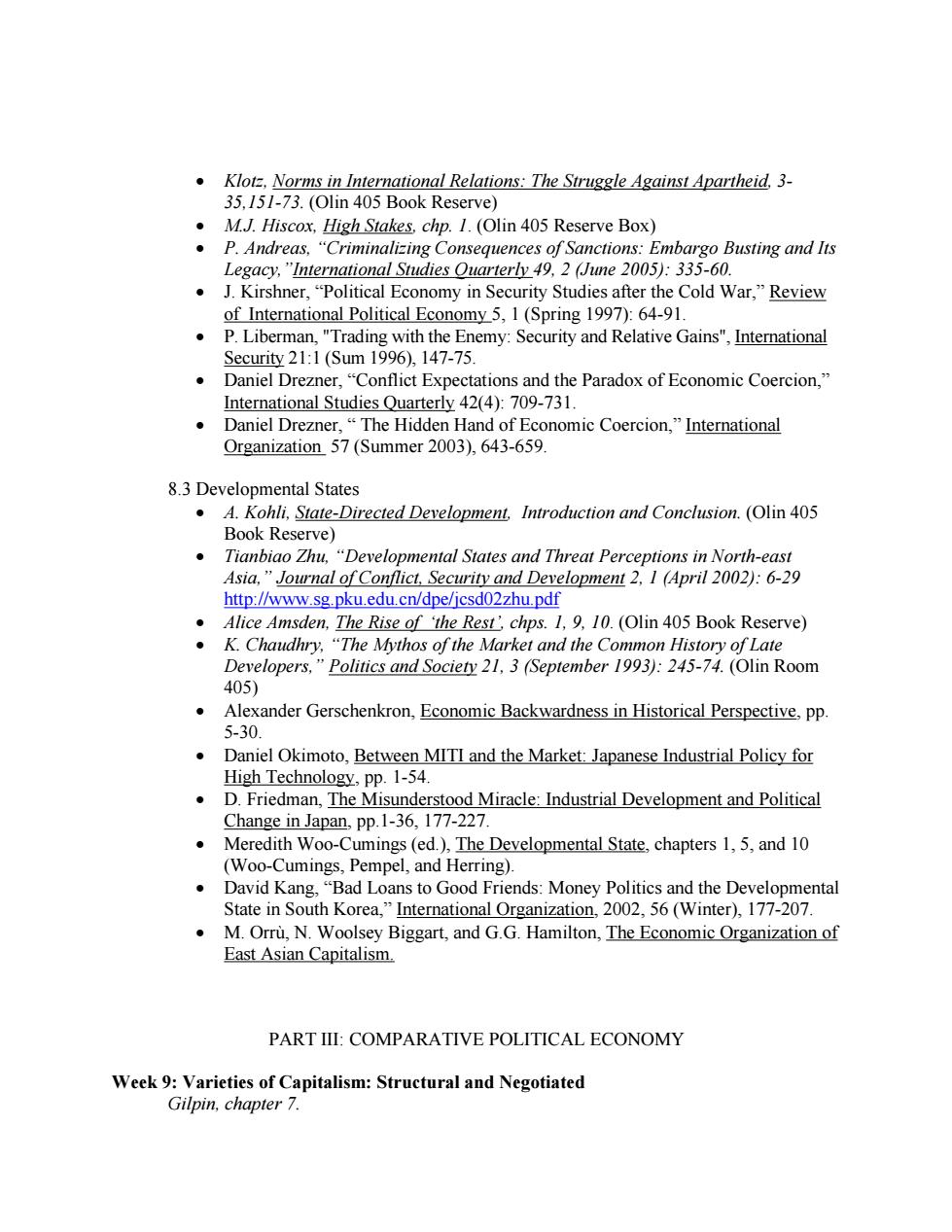
Klotz,Norms in International Relations:The Struggle Against Apartheid,3- 35,151-73.(Olin 405 Book Reserve) .M.J.Hiscox,High Stakes,chp.1.(Olin 405 Reserve Box) P.Andreas,"Criminalizing Consequences of Sanctions:Embargo Busting and Its Legacy,"International Studies Ouarterly 49,2 (June 2005):335-60. J.Kirshner,"Political Economy in Security Studies after the Cold War,"Review of International Political Economy 5,1(Spring 1997):64-91. P.Liberman,"Trading with the Enemy:Security and Relative Gains",International Security21:1(Sum1996),147-75. .Daniel Drezner,"Conflict Expectations and the Paradox of Economic Coercion," International Studies Quarterly 42(4):709-731. Daniel Drezner,"The Hidden Hand of Economic Coercion,"International Organization 57(Summer 2003),643-659. 8.3 Developmental States .A.Kohli,State-Directed Development,Introduction and Conclusion.(Olin 405 Book Reserve) Tianbiao Zhu,"Developmental States and Threat Perceptions in North-east Asia,"Journal of Conflict,Security and Development 2,I (April 2002):6-29 http://www.sg.pku.edu.cn/dpe/jcsd02zhu.pdf .Alice Amsden,The Rise of 'the Rest,chps.1,9,10.(Olin 405 Book Reserve) K.Chaudhry,"The Mythos of the Market and the Common History of Late Developers,"Politics and Society 21,3 (September 1993):245-74.(Olin Room 405) Alexander Gerschenkron,Economic Backwardness in Historical Perspective,pp. 5-30. Daniel Okimoto,Between MITI and the Market:Japanese Industrial Policy for High Technology,pp.1-54. D.Friedman,The Misunderstood Miracle:Industrial Development and Political Change in Japan,pp.1-36,177-227. Meredith Woo-Cumings(ed.),The Developmental State,chapters 1,5,and 10 (Woo-Cumings,Pempel,and Herring). David Kang,"Bad Loans to Good Friends:Money Politics and the Developmental State in South Korea,"International Organization,2002,56(Winter),177-207. M.Orru,N.Woolsey Biggart,and G.G.Hamilton,The Economic Organization of East Asian Capitalism. PART III:COMPARATIVE POLITICAL ECONOMY Week 9:Varieties of Capitalism:Structural and Negotiated Gilpin,chapter 7
Klotz, Norms in International Relations: The Struggle Against Apartheid, 3- 35,151-73. (Olin 405 Book Reserve) M.J. Hiscox, High Stakes, chp. 1. (Olin 405 Reserve Box) P. Andreas, “Criminalizing Consequences of Sanctions: Embargo Busting and Its Legacy,”International Studies Quarterly 49, 2 (June 2005): 335-60. J. Kirshner, “Political Economy in Security Studies after the Cold War,” Review of International Political Economy 5, 1 (Spring 1997): 64-91. P. Liberman, "Trading with the Enemy: Security and Relative Gains", International Security 21:1 (Sum 1996), 147-75. Daniel Drezner, “Conflict Expectations and the Paradox of Economic Coercion,” International Studies Quarterly 42(4): 709-731. Daniel Drezner, “ The Hidden Hand of Economic Coercion,” International Organization 57 (Summer 2003), 643-659. 8.3 Developmental States A. Kohli, State-Directed Development, Introduction and Conclusion. (Olin 405 Book Reserve) Tianbiao Zhu, “Developmental States and Threat Perceptions in North-east Asia,” Journal of Conflict, Security and Development 2, 1 (April 2002): 6-29 http://www.sg.pku.edu.cn/dpe/jcsd02zhu.pdf Alice Amsden, The Rise of ‘the Rest’, chps. 1, 9, 10. (Olin 405 Book Reserve) K. Chaudhry, “The Mythos of the Market and the Common History of Late Developers,” Politics and Society 21, 3 (September 1993): 245-74. (Olin Room 405) Alexander Gerschenkron, Economic Backwardness in Historical Perspective, pp. 5-30. Daniel Okimoto, Between MITI and the Market: Japanese Industrial Policy for High Technology, pp. 1-54. D. Friedman, The Misunderstood Miracle: Industrial Development and Political Change in Japan, pp.1-36, 177-227. Meredith Woo-Cumings (ed.), The Developmental State, chapters 1, 5, and 10 (Woo-Cumings, Pempel, and Herring). David Kang, “Bad Loans to Good Friends: Money Politics and the Developmental State in South Korea,” International Organization, 2002, 56 (Winter), 177-207. M. Orrù, N. Woolsey Biggart, and G.G. Hamilton, The Economic Organization of East Asian Capitalism. PART III: COMPARATIVE POLITICAL ECONOMY Week 9: Varieties of Capitalism: Structural and Negotiated Gilpin, chapter 7
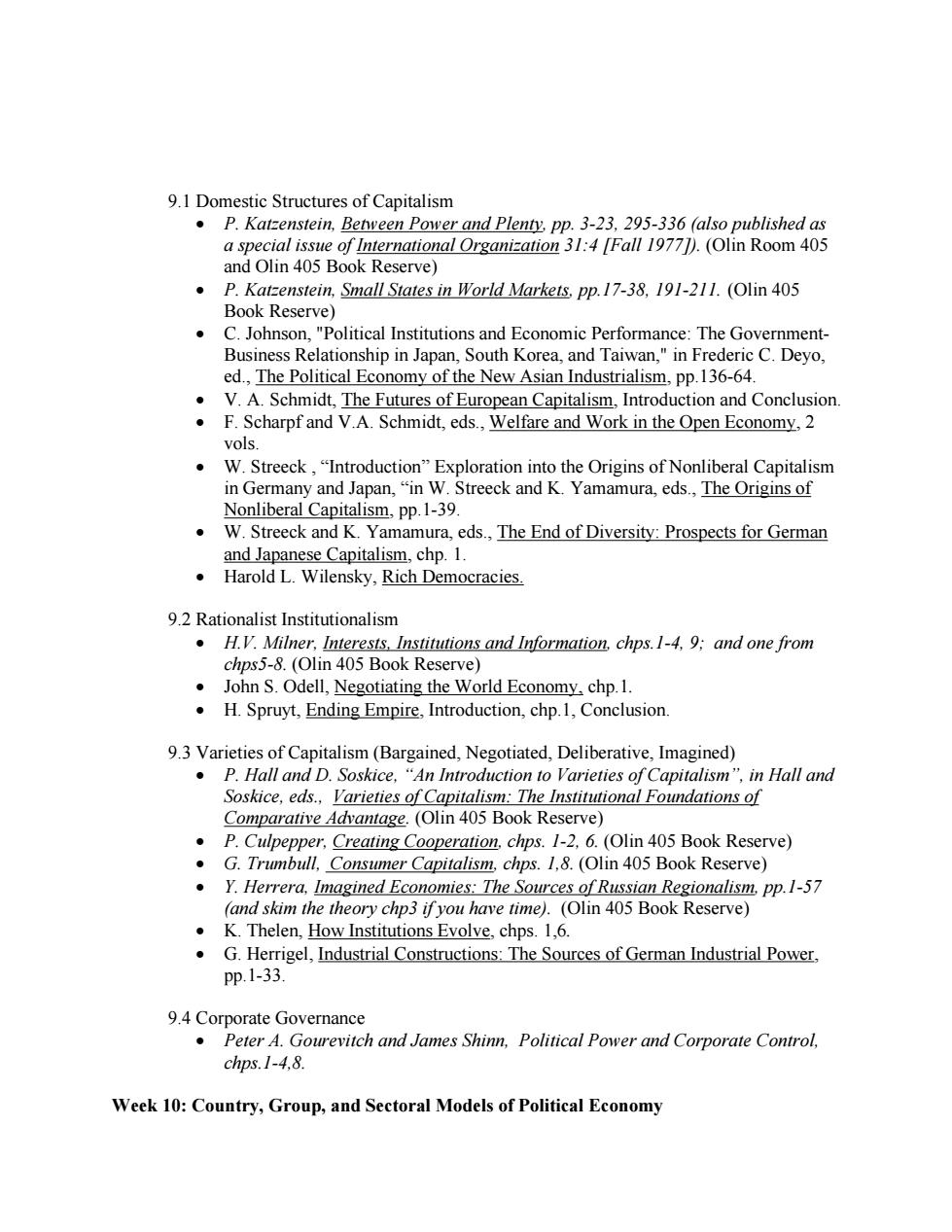
9.1 Domestic Structures of Capitalism P.Katzenstein,Between Power and Plenty,pp.3-23,295-336 (also published as a special issue of International Organization 31:4 [Fall 19771).(Olin Room 405 and Olin 405 Book Reserve) .P.Katzenstein,Small States in World Markets,pp.17-38,191-211.(Olin 405 Book Reserve) .C.Johnson,"Political Institutions and Economic Performance:The Government- Business Relationship in Japan,South Korea,and Taiwan,"in Frederic C.Deyo, ed.,The Political Economy of the New Asian Industrialism,pp.136-64. .V.A.Schmidt,The Futures of European Capitalism,Introduction and Conclusion. .F.Scharpf and V.A.Schmidt,eds.,Welfare and Work in the Open Economy,2 vols. W.Streeck,"Introduction"Exploration into the Origins of Nonliberal Capitalism in Germany and Japan,"in W.Streeck and K.Yamamura,eds.,The Origins of Nonliberal Capitalism,pp.1-39. W.Streeck and K.Yamamura,eds.,The End of Diversity:Prospects for German and Japanese Capitalism,chp.1. Harold L.Wilensky,Rich Democracies. 9.2 Rationalist Institutionalism H.V.Milner,Interests,Institutions and Information,chps.1-4,9;and one from chps5-8.(Olin 405 Book Reserve) John S.Odell,Negotiating the World Economy,chp.1. .H.Spruyt,Ending Empire,Introduction,chp.1,Conclusion. 9.3 Varieties of Capitalism(Bargained,Negotiated,Deliberative,Imagined) P.Hall and D.Soskice,"An Introduction to Varieties of Capitalism",in Hall and Soskice,eds.,Varieties of Capitalism:The Institutional Foundations of Comparative Advantage.(Olin 405 Book Reserve) P.Culpepper,Creating Cooperation,chps.1-2,6.(Olin 405 Book Reserve) .G.Trumbull,Consumer Capitalism,chps.1,8.(Olin 405 Book Reserve) .Y.Herrera,Imagined Economies:The Sources of Russian Regionalism,pp.1-57 (and skim the theory chp3 ifyou have time).(Olin 405 Book Reserve) K.Thelen,How Institutions Evolve,chps.1,6. G.Herrigel,Industrial Constructions:The Sources of German Industrial Power, pp.1-33. 9.4 Corporate Governance Peter A.Gourevitch and James Shinn,Political Power and Corporate Control, chps.1-4,8. Week 10:Country,Group,and Sectoral Models of Political Economy
9.1 Domestic Structures of Capitalism P. Katzenstein, Between Power and Plenty, pp. 3-23, 295-336 (also published as a special issue of International Organization 31:4 [Fall 1977]). (Olin Room 405 and Olin 405 Book Reserve) P. Katzenstein, Small States in World Markets, pp.17-38, 191-211. (Olin 405 Book Reserve) C. Johnson, "Political Institutions and Economic Performance: The Government- Business Relationship in Japan, South Korea, and Taiwan," in Frederic C. Deyo, ed., The Political Economy of the New Asian Industrialism, pp.136-64. V. A. Schmidt, The Futures of European Capitalism, Introduction and Conclusion. F. Scharpf and V.A. Schmidt, eds., Welfare and Work in the Open Economy, 2 vols. W. Streeck , “Introduction” Exploration into the Origins of Nonliberal Capitalism in Germany and Japan, “in W. Streeck and K. Yamamura, eds., The Origins of Nonliberal Capitalism, pp.1-39. W. Streeck and K. Yamamura, eds., The End of Diversity: Prospects for German and Japanese Capitalism, chp. 1. Harold L. Wilensky, Rich Democracies. 9.2 Rationalist Institutionalism H.V. Milner, Interests, Institutions and Information, chps.1-4, 9; and one from chps5-8. (Olin 405 Book Reserve) John S. Odell, Negotiating the World Economy, chp.1. H. Spruyt, Ending Empire, Introduction, chp.1, Conclusion. 9.3 Varieties of Capitalism (Bargained, Negotiated, Deliberative, Imagined) P. Hall and D. Soskice, “An Introduction to Varieties of Capitalism”, in Hall and Soskice, eds., Varieties of Capitalism: The Institutional Foundations of Comparative Advantage. (Olin 405 Book Reserve) P. Culpepper, Creating Cooperation, chps. 1-2, 6. (Olin 405 Book Reserve) G. Trumbull, Consumer Capitalism, chps. 1,8. (Olin 405 Book Reserve) Y. Herrera, Imagined Economies: The Sources of Russian Regionalism, pp.1-57 (and skim the theory chp3 if you have time). (Olin 405 Book Reserve) K. Thelen, How Institutions Evolve, chps. 1,6. G. Herrigel, Industrial Constructions: The Sources of German Industrial Power, pp.1-33. 9.4 Corporate Governance Peter A. Gourevitch and James Shinn, Political Power and Corporate Control, chps.1-4,8. Week 10: Country, Group, and Sectoral Models of Political Economy